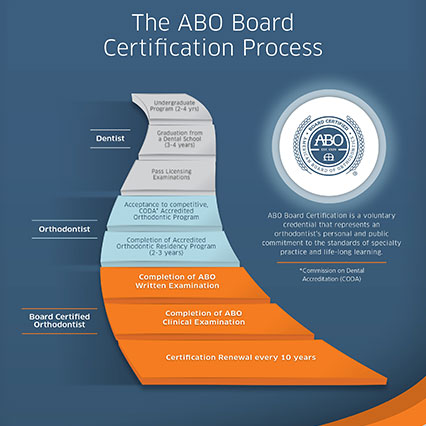
ABO Certification
Are all orthodontists board certified?
No. All orthodontists must be licensed to practice; however, board certification is a voluntary achievement that not all orthodontists choose to pursue. In order to become board certified by the American Board of Orthodontics, an individual orthodontist is thoroughly tested to demonstrate his or her orthodontic knowledge, clinical skills, and judgment.
The most fair, reliable, and valid testing methodology is utilized to test clinical proficiency in an objective manner. The ABO certification process signifies a unique achievement — a significant step beyond the two to three years of advanced education required for a dentist to become a specialist in orthodontics.
How many certifying boards are recognized by the American Dental Association in the specialty of orthodontics?
One. The American Board of Orthodontics is the only certifying board in the specialty that is recognized by the American Dental Association. The ABO was founded in 1929 and is the oldest specialty board in dentistry. The board’s purpose is to elevate the quality of orthodontic care for the public by promoting excellence through certification, education and professional collaboration.
Why would an orthodontist choose to complete this voluntary certification process?
Successful completion of the examination process demonstrates the orthodontist’s personal commitment to excellence in orthodontics — to both the orthodontic profession and the general public. It exemplifies a practitioner’s commitment to continue to keep abreast of the latest advances in patient care, and to deliver these latest advances to patients. Many orthodontists see it as a demonstration of their dedication to the specialty and the highest level of personal achievement.
What steps are required to complete the ABO certification process?
Since the establishment of the ABO in 1929, the certification process requirements have continued to adjust to the demands of the specialty. Today, the process involves a thorough Written Examination (240 questions) covering all areas of orthodontics and dentofacial orthopedics about which an orthodontist should be knowledgeable. Successful completion of this board examination allows the orthodontist to proceed to the Scenario-based Clinical Examination, where he or she is objectively evaluated on knowledge, abilities, and critical thinking skills based on proficiency and clinical excellence in four core performance areas/domains. Both examinations take significant preparation and time.
After successful completion of these examinations, the orthodontist has officially achieved board certification for a limited time period. The orthodontist must go through Certification Renewal every 10 years to maintain certification status by demonstrating this continued level of patient care.
For further information about the American Board of Orthodontics and board certification, click here.



 Website Powered by Sesame 24-7™
Website Powered by Sesame 24-7™